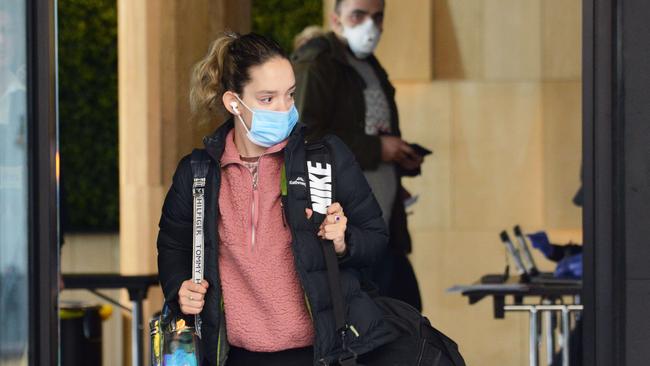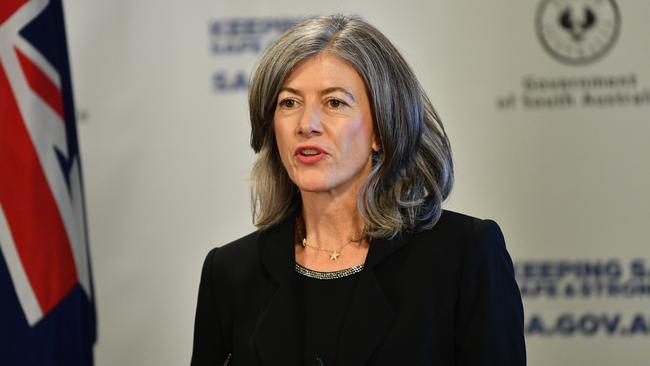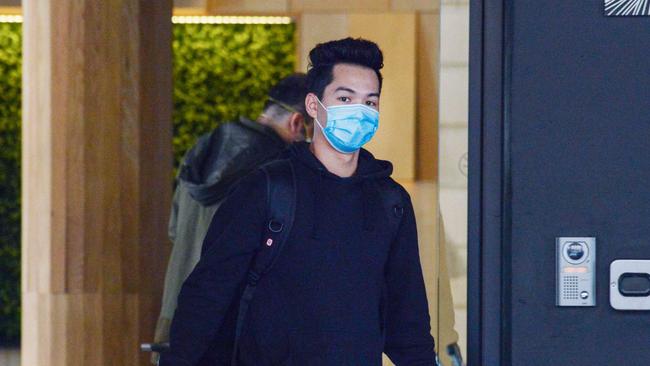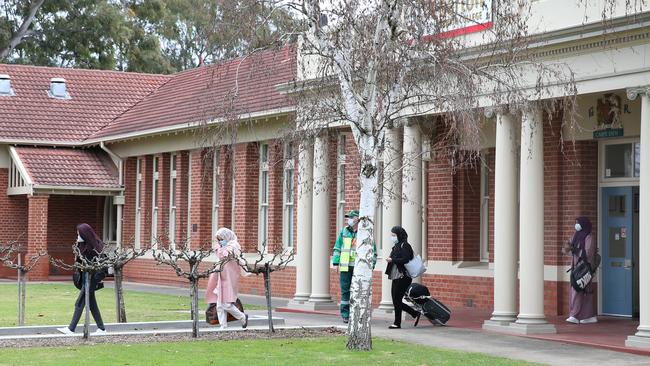Thebarton COVID-19 cluster largely contained as 1400 people come out of self-isolation
The “Thebarton cluster”, linked to five COVID-19 cases, is contained. As about 1400 people emerge from quarantine today, an upbeat Professor Spurrier says there’s no need to fear shopping in the area where the outbreak was centred.
Coronavirus
Don't miss out on the headlines from Coronavirus. Followed categories will be added to My News.
More than 1400 people linked to a cluster of five COVID-19 cases, which forced the shutdown of two schools, have walked free after completing isolation.
Close contacts to the positive cases were overjoyed to leave the Ibis Hotel, Grenfell St, on Saturday morning.
Guests filed out of the lobby area one-by-one in a co-ordinated exit.
While some waved and briefly pulled down their masks to reveal a smile, others rushed to waiting taxis just wanting to be home.
Some were lucky to be picked up by relieved loved ones.
In total 94 people, mostly migrant students, left the medi-hotel after 14 days in quarantine.
SA Health reported no new cases on Saturday, a day after revealing an expatriate man, aged in his 30s, had become the state’s 460th case as the number of tests hit 316,425.
There are seven active cases, four of which are linked to the Thebarton cluster, which The Advertiser revealed on Saturday had been contained.

Elsewhere across Adelaide, about 1100 casual contacts of the outbreak – dubbed the “Thebarton cluster” after a near mass infection at a school – finally left their homes or nominated quarantine sites.
A Blair Athol man in his 20s returned from Victoria on July 27 and chose to self isolate at the Walkers Arms Hotel, sparking the quick spread.
He infected a cleaner at the hotel, a man in his 50s from the northern suburbs, whom he spoke to for about 20 minutes.
He also infected a close contact woman in her 20s who attended Thebarton Senior College and Roma Mitchell College as a mature age student.
She then passed the infection on to another woman in her 20s who also attended Thebarton Senior College, as well as a second woman in her 20s known to be a close friend.

Speaking on Saturday at a state-first dedicated multicultural testing clinic at the Wali-e-Asr Centre, Edinburgh North, in the northern suburbs, chief public health officer Prof Nicola Spurrier spoke of her delight at the Thebarton cluster being brought under control.
She urged people to return to Prospect Road, the location at which two businesses were named as part of a public health alert.,
Alerts were issued for locations visited by one of the cluster’s female patients, including Agha juice house, Blair Athol and a Kilburn Persian rug business, Najafi Carpet Gallery, both of which are located on Prospect Road.
A Salisbury Downs gym, Fernwood Fitness, was also named.
The mobile clinic, using decommissioned ambulances, had interpreters and ethic community leaders on hand to help sick people.

Prof Spurrier said there were no health risks shopping along Prospect Road and bought a birthday cake from the shopping strip on Friday for a colleague.
“I know there are a number of businesses on Prospect Road who may have been affected by this news,” she said.
“These places are perfectly safe to visited and I hope the businesses pick up.
“There are also some other key businesses on Prospect Road that might have also felt impacted during the time. But it is perfectly safe to visit and in fact I went and picked up a wonderful chocolate cake from a ... bakery yesterday (Friday). There is no reason to avoid Prospect Road businesses.”
She was “extremely pleased” to get the news that the cluster’s close contacts had been cleared.
While it was “very good news”, she said she wanted to monitor two “full incubation periods” of a fortnight each before she could say “we are home and hosed”. “But we are in a very good position,” she said.
She said while there had been no community transmission in a very long time, people should not become complacent.
SA Health said help from the state’s multicultural leaders and their communities was vital in containing the spread.

In a major breakthrough on Friday night, 94 “close contacts” – mostly migrant students – were cleared of having the virus, as SA’s “grateful” top public doctor declared the cluster’s transmission halted.
“We know COVID-19 is a virus that doesn’t discriminate and people of all ages and backgrounds can be affected,” said Prof Spurrier.
“Today I am one step closer to saying we have resolved this cluster. While we will continue to very closely monitor the situation, we have had no further transmission within the close contacts.”
But Prof Spurrier said she would be “completely reassured” it was contained after two, 14-day incubation cycles were completed in a fortnight.

The cluster shutdown came as SA Health on Friday recorded a new case. Officials said the state’s 460th COVID-19 case, a man in his 30s who arrived from India two weeks ago, posed no public health risk.
After flying from New Delhi on August 1, he recorded a positive test on his 12th quarantine day at the CBD’s Pullman Hotel.
He is among seven “active” – or infectious – patients, including the cluster source, an Afghan man aged in his 20s from Blair Athol who returned from Victoria.
His close female friend, a Thebarton Senior College student aged in her 20s, is ill, as is her Afghan student mate, also in her 20s, and a Walkers Arms hotel cleaner, aged in his 50s, who had a 20-minute chat with the male source.
A fourth Afghan student, 26, has recovered. The last of more than 1400 family, friends and other contacts will on Saturday leave hotel quarantine or self-isolation at home.
Close contacts included migrant students from the Middle East, Africa, China and other parts of Asia. Many were separated from family but most return to school on Monday.
“I’m very grateful for the co-operation of all the young people involved as I recognise this has been a very stressful time,” Prof Spurrier said.

She said when the state’s fifth cluster became apparent on July 30, a “key factor that enabled us to manage (it) was reaching out to the community … in a timely manner”.
After urgent talks with more 20 cultural leaders, translated information was sent to more than 5000 community members and special language hotlines launched to manage inquiries.
In contrast, Victoria had failed to adequately communicate with its own migrant communities, which fuelled a surge in cases.
Mosques and community centres were shut across Adelaide’s northern suburbs while public alerts were issued about several businesses. Prof Spurrier gave out her personal number to the leaders and urged them to contact her at any time.
Afghan United Association chairman Hussain Razaiat, 47, said it was important the community listened to official advice.
“At that time, there was a panic, and some state of fear (in) the community, in particular from new arrivals, who had come from oppressed regimes,” he said.
“We assured them they must co-operate with the government … to successfully stop it spreading. We are pleased it has been stopped so everybody can get back to normality.”
Multicultural Youth SA chief executive Tamara Stewart-Jones, 36, said her staff volunteered help with food, advice and supplies “24-7”.
SA Health will on Saturday launch its first multicultural mobile testing clinic at Edinburgh North in the northern suburbs.
